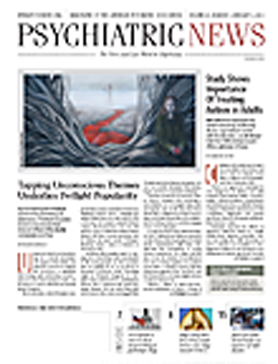The Board of Trustees held a very productive meeting in Arlington, Va., in mid-December, with a great spirit of collaboration and teamwork. The Report From the President was early on the agenda, which gave me a chance to update the Board on some of my APA activities. I have set up weekly phone calls with Dilip Jeste, APA president-elect, and with Jay Scully, APA medical director, and I have regularly scheduled calls with Ann Sullivan, speaker of the Assembly, and with the Executive Committee, allowing us to stay focused on priority concerns such as the federal deficit-reduction efforts, developments in health care reform, maintenance of certification and maintenance of licensure issues, scope-of-practice concerns, DSM-5, and more. I have also been traveling quite a bit to attend meetings and make presentations at state association and district branch meetings, which has been enormously rewarding. I’ve been able to meet many members I hadn’t previously known and to learn about local concerns and a lot of good work being done at the state and local levels.
At the Board meeting, we did some brainstorming about whether APA should explore the unregulated world of e-therapy or Internet therapy, something I discussed in a previous column (Psychiatric News, November 18, 2011). There was good agreement that as social networking evolves at warp speed, we should think about whether we can develop standards that might guide our patients and families in this uncharted territory. We will take this back to several of our councils and to the Assembly for further discussion. And speaking of councils, I suggested that we set up a rotation system so that a couple of council chairs would be invited to each Board meeting to allow an interactive discussion about the council’s work. The Board liked the idea, so we’ll do it.
Jay Scully then presented highlights from his Medical Director’s Report (which I always recommend that you check out on APA’s Web site—it’s packed with good information. See end of article for URL). He reported that the Web site redesign is close to completion—it will soon move into the testing and training phase, with launch expected in late February or early March.
Along with staff members Sam Muszinski, Nick Meyers, and Gene Cassel, Jay summarized our advocacy work, which has been intense, particularly, as he said, in the wake of the demise of the “not-so supercommittee.” One development that occurred just before the Board meeting was the emergence of an omnibus bill in the House to postpone physician fee cuts until January 1, 2014. However, this was shot down by the Senate and replaced with a bill that provided only a two-month patch. Then the House rejected the Senate’s solution, only to then pass it a few days later, so here we go again!
The failure of the budget supercommittee increases the likelihood of sequestration by January 2013, which could lead to automatic Medicare cuts of at least $123 billion and a potential 12 percent reduction of reimbursement to physicians, amounting to roughly $14 billion. On a positive note, advocacy work has also included APA testimony to a House Ways and Means subcommittee that helped transform a hearing on the alleged overuse of the diagnosis of ADHD into a useful discussion of the strengths and weaknesses of the SSI/kids program.
We spent considerable time discussing membership, hearing a report from Joe Rubin, chair of the Membership Committee; Ann Sullivan, chair of the Board’s Membership Work Group; and Dilip Jeste, chair of the Board’s Work Group on International Activities (which focused a lot on enhancing international membership). We had excellent updates from Debbie Hales, head of APA’s Education Division, on FOCUS: The Journal of Lifelong Learning and CME activities; from Becky Rinehart, APA’s publisher, on exciting new Web-based publishing innovations; and from David Kupfer, Darrel Regier, and Ken Kendler on DSM-5. Bob Kelly, chair of the Elections Committee, presented a series of action items that were approved, removing a number of restrictions on our campaigning process. Ann Sullivan presented her Assembly report, describing a very successful November 2011 Assembly meeting, at which the Board and the Assembly worked together in a good partnership. And APA Treasurer David Fassler presented his report, with a continuing good message that APA is holding steady and is in strong financial shape.
Finally, Paul Summergrad, chair of the Board Work Group on the Role of Psychiatry in Health Care Reform, gave a report on the early work of his group, outlining the key areas the group has identified for review and analysis. This is a stellar group of experts; its reports to the Board will be valuable, and I’ll make sure that this information is made widely available to members. One thing is for sure about the role of your APA president: there’s never a dull moment!

